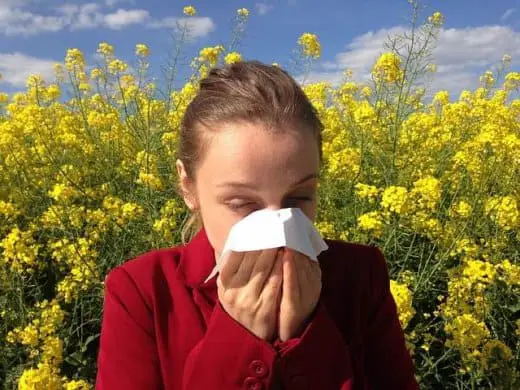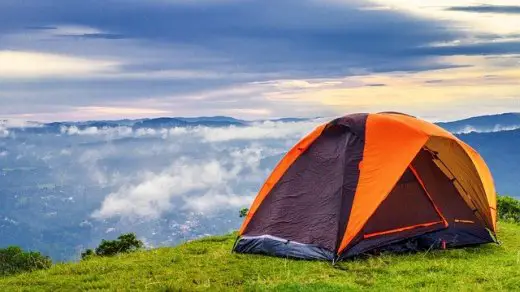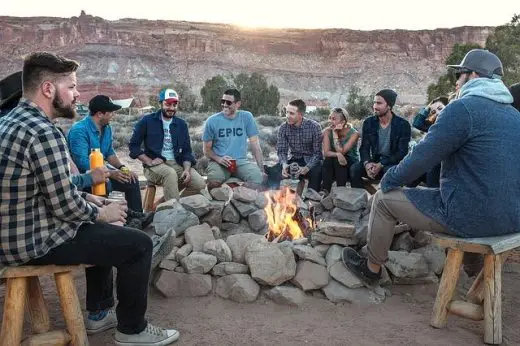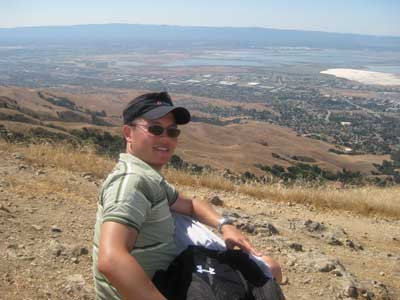
If you have an allergy or are asthmatic, spending extended periods of time outdoors can be challenging.
You never know when a gust of wind may send some pollen your way, causing an outbreak of sneezing, wheezing, and coughing.
However, just because you have allergies or even asthma, you don’t need to stop yourself from enjoying outdoor activities like hiking and camping.
When planning a camping trip, simply follow the Boy Scout motto and be prepared. Make sure that you’ve got an allergy and asthma attack action plan, that you’ve packed the right medications and relief aids, and that your camping buddies know how to help you if you have an allergy or asthma attack.
Choose Your Area And Season Well

While you’re planning where and when to camp, do some research about the areas that you’re considering and think about how it may trigger allergies.
Outdoor allergies and asthma attacks are typically triggered by pollen from grass, trees, and flowers. The American Academy of Allergy, Asthma, and Immunology has a vast database of information on the pollen counts in different areas across the US. It can be useful in helping you decide where to camp; try to choose areas with a lower pollen count.
When deciding on a campsite, look for a cleared area which will be surrounded by less unfamiliar plants, which can be triggers. Pine forests, beachsides, and deserts have been found to be better for campers with allergies or asthma as the air in these environments contains fewer triggers.
Allergies typically flare up in the summer and spring because all the plants are thriving and busily spreading pollen through the air. If you do suffer from severe allergies, then it may be better to plan your camping trip in the fall.
Choose The Right Tent

As well as wisely choosing where you’ll camp, you want to be sure that where you’re sleeping does not add to the chance of you developing allergies.
Make sure that your tent is made with hypoallergenic material (look at the tent’s literature) as it will be less likely to hold onto pollen and dust mites.
Check that the tent flaps and zips are working, as while you’re camping it’s helpful to keep your tent shut whenever you’re not in it, so allergens don’t collect.
To be extra sure that your tent is not unwittingly carrying allergen causing particles, give it a thorough cleaning with bleach and water a few days before your camping trip, and air it out in direct sunlight.
If you have severe allergies, it may be worthwhile to look for a cabin to overnight in as it will contain fewer allergens and protect you better from the elements.
Have A Medical Action Plan

Everyone with severe allergies or asthma has an action plan, which details steps to take to reduce the chances of an attack as well as how to address it if one happens.
While you may already have an action plan, visit your doctor before your camping trip to tailor it based on where you’re going and what medications you may need. Your doctor may recommend you pack your first aid kit with:
- Immunotherapy tablets which can be taken in the days leading up to your trip and which will help your body build a resistance to allergens. Talk to your doctor about whether you should take immunotherapy medicines and which ones you should take.
- Antihistamine medications which provide relief from asthma and allergy symptoms like wheezing, coughing and congestion. While these can be bought over the counter, ask your doctor for recommendations on dosage and the strength of antihistamines you should take.
- Controller inhalers which contain medicines that reduce inflammation in the lungs and airways which lowers the likelihood of you getting an attack. It’s best to use a controller everyday you are camping and especially before engaging in strenuous activities like hiking or kayaking.
- Rescue inhalers which release fast acting medicines that need to be taken in case of an allergy or asthma attack.
- Spacers can be attached to your inhaler to help ensure most of the medication you’re inhaling moves to your lungs and not your mouth or stomach.
- Nasal steroids can be used to clear inflammation and nasal congestion.
- Epinephrine auto-injectors which are used to treat severe asthma and allergic reactions like wheezing and hives. Keep your Epinephrine in a cool area – preferably in your tent or backpack.
Your medical kit is the most important tool in dealing with your allergies and asthma while camping, so check and double-check that you’ve got it before you go!
Make sure that you’ve packed plenty of replenishments and doses of medications as the nearest pharmacy may be hours away from your campsite.
Once you decide on where you’ll be camping, do a bit of research about the closest medical services in the area and update your action plan with addresses, directions, and contact information.
Keep your action plan on you with a copy in your medical kit so that in case of emergencies, the information is readily available.
Avoid Common Allergy Triggers

The best-case scenario would be to make sure that you don’t need to delve into your medical kit too much. As well as selecting the right time and place to camp in, familiarise yourself with things which may trigger an asthma or allergy attack. These include:
- Campfires: More specifically, campfire smoke. Campfires are a quintessential past of camping, but if you have allergies, you may want to ask someone else to roast your marshmallows. The campfire smoke can irritate your airways and bring on an attack. If your fellow campers do want a campfire, sit out of the smoke’s reach, paying attention to whether the wind is blowing it towards you.
- Fur: Some people love camping because they can bring their furry friends along. But, if you have allergies, don’t allow your dog to sleep in the tent with you – the fur floating around in an enclosed space will likely trigger an attack.
- Altitude: Because there is less oxygen in the air, higher altitudes can make you more likely to have an asthma attack. As far as possible, try to stay on low ground when camping.
- Cold weather: In cold weather, your body produces histamine, a substance that is also produced during an asthma attack. As a result, you may actually develop an attack in colder weather – regularly using your controller can help prevent them.
- Insects and parasites: When you’re out exploring insect bites or stings may trigger an allergic rash or hives. You could also pick up tiny parasites while swimming, which can cause itchy skin outbreaks.
Of course, you should also avoid foods that may bring on allergies as when you’re in the wild, as treatment may be hard to find. As far as possible, cook your own food or, if you’re eating prepackaged food, scrutinize its contents to ensure there are no allergens in it.
Talk to your camping companions about your food allergies and ask them to let you know if they’re serving any food, which may be an allergy trigger.
Educate Your Camping Buddies

When you’re in the midst of an attack, you may not be able to administer medication on yourself. Talk to the people you’re camping with about your allergies or asthma; explain what brings it on and how to recognize the symptoms.
Share your action plan with them and tell them what they may need to do if you have an attack, including showing them where your medication is kept and what medication you need in each scenario.
It’s also a good idea to wear an allergy bracelet, which should include your name, information about what you’re allergic to, emergency contact numbers, and emergency procedures to follow in the face of an incapacitating attack.
The chances that you have a severe attack are low, but making sure the people around you know how to help will make sure you’re better prepared and protected.
This article is owned by Recapture Nature and was first published on November 22, 2019
Final Thoughts
Indeed, if you prepare well by picking the right time and place to go camping and packing the right tools, having allergies or asthma won’t affect your camping trip. Simply stay aware, stay careful, and enjoy some wonderful time outdoors!

